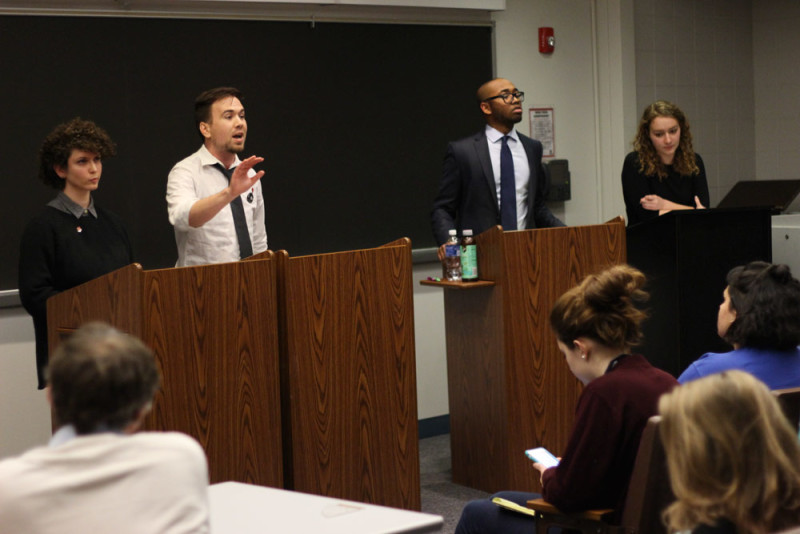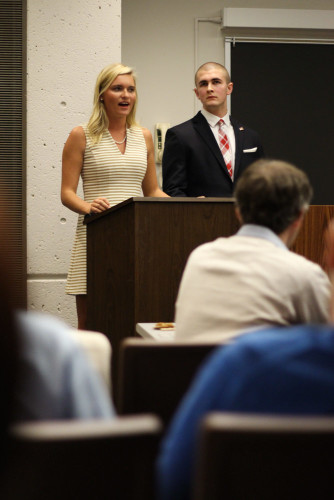
DePaul College Republicans, Democrats and Socialists faced off on March 1 for an occasionally raucous three-way debate that revealed the deep political and ideological divides between each group.
The event, dubbed the “Battle on Belden,” was held in a packed second floor room of the Schmitt Academic Center. Political science professor Joseph Mello served as moderator, overseeing several rounds of prepared questions – which included the economy, foreign policy, immigration reform and race – and a collection of audience-submitted topics toward the end of the evening.
Who won the debate? That probably depends on who you’re asking.
It’s a common stereotype, to be sure, that Republicans are a political minority on DePaul’s campus. Whether or not that will ever be statistically proven remains to be seen, but the debate audience seemed to corroborate that sentiment. Snaps and approving hollers from the crowd were reserved solely for the Democrats and Socialists, with the exception of a small corner near the front of the room with several people wearing “Make America Great Again” hats.
When College Republicans President Nicole Been suggested during the immigration portion of the discussion that the U.S. needed to build a wall, the audience responded with boos. They outright laughed when her fellow debater Brendan Newell repeatedly insisted that the American public should stop vilifying bankers.
“Not every banker is bad, okay?” Newell said, but timidly, as if he already knew what people would think.
“It’s time to build a wall,” College Republicans Pres. Nicole Been says to a chorus of boos #BattleonBelden
— Emma Krupp (@EmmaKrupp1) March 2, 2016
Consequently, Republican debaters remained on the defense throughout the night, often fielding snorts of derision and other interjections from the Socialists. Newell asked them to stop interrupting him no less than three times, at one point heatedly asking Mello to tell his fellow debaters “to be respectful on the platform.” Mello declined his request.
The Socialists, for their part, seemed more than happy to stoke the proverbial fires and incite tensions between both the Republicans and the Democrats. Although the Democrats and the Socialists were overall the two most ideologically aligned groups, the Socialists did not hesitate to call them out for certain sentiments. After the Democrats posed a question to the Republicans about foreign intervention, Socialist debater Hannah Utain-Evans was quick to fire back.

“I feel like the Democrats are trying to set up the Republicans as the insane war-mongers that spout out craziness, in order to paint themselves as the sane war-mongers,” Utain-Evans said. “Their historical record over the past 100 years shows that we’ve been led into more wars under the Democratic Party than we have under the Republican Party.”
Socialist John Kurinsky gesticulated wildly and passionately during his speeches, often invoking the quotes of historian Howard Zinn and Martin Luther King.
The Democrats rode somewhere in the middle of the other two groups, largely espousing crowd-pleasing values like affordable college plans and humanitarianism in foreign policy. This tactic seemed to fit in neatly with their repeated mantra of compromise.
“We can’t dig our heels into the ground and say ‘we’re only going to do this our way or no way,’” said Democratic debater Mikayla Ziegler. “There’s too much at stake for that.”
Comments from each speaker, regardless of political affiliation, were met with a polite round of audience applause.
Perhaps the most stirring moments of the evening came during the discussion of race relations, especially in regards to police brutality and the Black Lives Matter movement. Nassir Faulkner, president of College Democrats, relayed how his mother had to teach him how to behave around police and questioned the unfair treatment of minorities by law enforcement.
“When in our country did we decide that committing a crime meant your life was taken away before you were put on trial?” Faulkner asked. “Far too often in this country, you have black men that are targeted.”
DePaul Dems Pres. Nassir Faulkner: “I’m black, I’m going to speak up” #BattleOnBelden
— Emma Krupp (@EmmaKrupp1) March 2, 2016
Newell attempted to relate to Faulker’s general idea, but his execution was not well received.
“The reason why there’s a lot more police brutality and police involving black Americans is the fact that there’s more crime committed by blacks,” Newell said, which was met with audible groans from the crowd. “It’s not because they’re black. It’s because of the fact that African-Americans are more likely to be in impoverished situations and therefore commit crime.”
In spite of individual ideological quarrels, the three groups managed to rally around one singular idea: political involvement. Whether that be through grassroots community organization or simply getting out to the ballot, they closed urging students – and the American public in general – to take action for tangible political change.
“Whether you vote for a Republican or you vote for a candidate that the Socialists support or you vote for any of the Democratic candidates, it’s important to have your voice heard,” Faulkner said.

